by Catherine Fisher
Genre: YA steampunk
My Rating: ★★★
Description:
This prison is alive.
Finn has lived in Incarceron for as long as he can remember, but he's sure he wasn't born there. For years, he's experienced strange visions he believes are clues to his past life: a life outside of Incarceron.
Claudia is the daughter of the Warden of Incarceron, forced into a complex political marriage that she's desperate to escape from.
Two separate worlds. Two separate lives. But when Finn and Claudia discover identical copies of a strange object -- an object that somehow allows them to communicate with each other -- a plan begins to form. A plan to enact an escape from an inescapable prison.
But the prison has other ideas.
Overall Thoughts
Incarceron was a hard book for me to rate. On one hand, there were elements of it that I loved. On the other hand, it leaned heavily on several tropes that I'm rather tired of seeing. But I ended up enjoying reading it despite its flaws, so I gave it a higher rating.
I honestly love reviewing books that I have mixed opinions about. I like being able to point out things I didn't like about a book, but at the same time being able to say, "yeah, this part wasn't the greatest, but what the author did here? Brilliant." So without further ado, I'm going to get into it.
The Characters
The Characters
I'll start with the two main characters, Finn and Claudia. Finn was my favorite of the two; I really liked his whole backstory thing that was revealed near the beginning (though I didn't like how it was told, more on that later), and I just liked him as a character? Maybe he's not the greatest protagonist out there, but he was still a good character and I liked reading his POVs.
Claudia... I honestly didn't care about her at all. She's a character we've likely all seen before: rich girl who doesn't like her arranged marriage and is trying her hardest to find some way out of it. Now, that's not to say I was annoyed by her. I wasn't. I just didn't care about her either way. Also, the stakes on her side, compared to the stakes Finn was facing, were not very high.
The secondary characters were hit and miss. I liked Jared (actually, he was probably my favorite character in the whole book), and ended up getting somewhat attached to Keiro even though he's a jerk. Attia... I didn't really see enough of Attia to form a very good opinion of her. But she was a decent character, and I did love some of her dialogue.
Overall mixed feelings about the characters. Most of them weren't brilliant and definitely won't make it onto my list of favorite characters? But at the same time, they weren't bad characters. They just weren't the best.
Plot/Pacing
In terms of plot, it was well paced, but nothing brilliant. There were a few points in the story where it looked like conflicts were being resolved through deus ex machina (though this was actually addressed later on, it did irritate me a little at the time.) One aspect of the plot was... rather predictable. I called the twist very early in the story, but at the same time, I still don't know how I feel about it. That particular plot line was left loose, and so could be resolved in a way that would make me very satisfied, or... not. I'll have to read Sapphique to really make up my mind how I feel about it.
Another plot twist did catch me completely off-guard -- it was something I wasn't expecting at all, though I'm sure a few astute readers will be able to catch it (I'm not good at predicting plot twists whatsoever.)
Worldbuilding/Writing
The worldbuilding -- and especially the concept of a sentient prison -- was probably my favorite aspect of the whole novel. There were a bunch of neat concepts that were put into play here: the prison doesn't waste anything, so it creates new animals -- and sometimes people -- out of, well, dead material. The concept of the halfmen (cyborgs, but created by the prison) was also really interesting. I thought that the prison aspects of the novel had some really unique and interesting world building.
Incarceron itself is a major character in the novel, and I liked that, too -- it was kind of creepy, knowing that the prison had a mind of its own, and that the characters were trapped inside it.
Now, I mentioned at the beginning that I didn't like how Finn's backstory was told. Here's why: it was mostly told through dialogue. While there's nothing wrong with using dialogue in this way, I thought that the way Finn told his story was a little bit... too detailed? Many people, when recounting a story, tend to not talk about smaller details, which Finn did, and it stuck out as being a bit odd. Maybe this was the author's intention -- that Finn did notice these small details and wanted to talk about them. But it didn't ring quite true to me. There were a few other sections of dialogue throughout the story used in a similar way -- not enough to annoy me hugely, but enough that I did notice.
Overall, a very unique (and sometimes very weird) steampunk novel. I enjoyed it and will definitely be reading Sapphique in the near future.
Content
Recommended for ages 14 and up.
Minor swearing similar to an average YA novel (think of it as similar in this aspect to Cinder by Marissa Meyer).
Sexual content is limited to a few comments about a character's appearance, an arranged engagement, a rumored (though untrue) affair between two unmarried people, and a few comments about a minor character's love life.

































